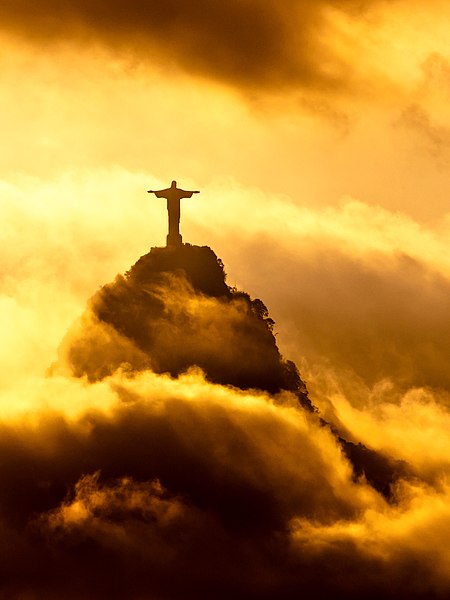By “peak Jesus” I mean that there may be a limit to how much Christianity the world’s population will ever absorb, and we’ve reached it. Indeed, the peak may be over and the decline begun. I could be wrong, of course. And I do not intend disrespect to either Jesus or Christianity. But let’s look at some trends.
For some time Europe has been called “post Christian.” This is because Christianity is no longer the dominant civil religion of Europe. To say that Europe is “post Christian” is not to say that Europeans are no longer Christian. About 64 percent of the population of the Eurpean Union is Christian, down from about 95 percent a century ago. Post Christian in this sense means that Europeans on the whole have absorbed values and worldviews that do not come from Christianity.
The United States is not exactly post Christian, yet. But as I wrote in another recent post, “Why Are There More Nones?,”
… in 1900 or so Christians were 90 to 97 percent — sources vary — of the population of North America. As recently as 1972 polls were finding that about 90 percent of U.S. citizens identified as Christian. Today, according to Pew Research, about 63 percent of Americans identify as Christian. In a few decades, Pew says, Christians could be less than 50 percent of the U.S. population.
Peak Jesus and the “Great Commission”
The Great Commission is the instruction given by Jesus to his disciples in Matthew 28:18-20, to “make disciples of all the nations.” This has given us many generations of missionaries who have carried Christianity to the ends of the earth. This made Christianity the overwhelmingly dominant religion of the entire Western Hemisphere, for example. The problem is that there isn’t much of the earth left that either hasn’t been thoroughly “missioned” or is closed to Christian missionaries.
There are parts of Asia — Sri Lanka is an example — that have been nearly saturated with Christian missionaries for as many as five centuries. And after five centuries, Sri Lanka today is about 6 percent Christian. A big part of the problem for Christian missionaries in most of Asia is that Christianity came to be inextricably linked to European colonialism in peoples’ minds. And European colonialism is not fondly remembered. Yet several Christian organizations continue to send missionaries into these same barren and over-plowed fields.
Some Asian countries have passed “anti-conversion” laws that place many restrictions on foreign missionaries, both Christian and Muslim. These laws were passed in part to please followers of the dominant religion, usually either Buddhism or Hinduism. But they were also passed because foreign missionaries sometimes come across as disruptive and even predatory.
Subsahara Africa already has a significant Christian majority. Several African nations have a higher percentage of Christians in their populations than Europe or North America, in fact. Foreign Christian missionaries still go there, although I’m not sure why. Perhaps the Democratic Republic of the Congo (95 percent Christian) should be sending missionaries to post-Christian Europe.
Peak Jesus: Fools Rush In …
North Africa, on the other hand, is mostly Muslim. This brings us to the fact that many Muslim-majority nations have laws in place that ban proselytizing for any religion other than Islam. Even where it isn’t specifically banned, open Christian missionary work is dangerous for missionaries, and conversion from Islam is punishable by death.
But of course, evangelicals must evangelize. The problem is that foreign missionaries often make life harder for indigenous Christians. Susan Sachs wrote in the New York Times (December 31, 2002), “The Orthodox and Coptic churches, which have lived among Muslims for centuries, know how to cultivate their own flocks without threatening the political territory of Muslim rulers and clerics. The newly arrived evangelical Christian groups, in the view of these older indigenous churches, trample the unwritten rules.” (I’ve heard similar complaints about foreign evangelical missionaries from Asian Christians in Buddhist countries.)
Where Angels Fear to Tread
Two especially irresistable targets for missionaries are the People’s Republic of China and North Korea. I occasionally read about missionaries getting caught trying to smuggle Bibles into China. They believe the Bible is banned in China. In fact, one of the biggest Bible publishers in the world is located in Shanghai. There are lots of Bibles in China. However, the Chinese Communist Party (CCP) controls their distribution and allows them to be sold only in approved bookstores.
The government of China regulates all religious activity, which is mostly to be sure (a) nothing is being taught in churches that contradicts the CCP, and (b) churches are not being controlled or influenced by foreigners. The Chinese have long-standing issues about foreign missisonaries and religions that go back to the Boxer Rebellion and probably earlier. Would-be missionaries trying to sneak into China just make Beijing more paranoid. And however paranoid Beijing is, Pyongyang is worse.
Where No Missionary Has Gone Before
There are people in the far reaches of the Amazon rain forest who possibly have not heard of Jesus. Terrence McCoy wrote for the Washington Post (“U.S. missionaries have long tried to convert the ‘unreached’ in the Amazon. Now Indigenous groups are fighting back,” October 31, 2021) that tribal leaders put aside their differences to discuss a common adversary.
Their forest was beset by outsiders — illegal gold miners, land grabbers, deforesters. But the time had come to confront the one who predated them all.
“Missionaries,” Marubo said.
This area of Brazil, called the Javari Valley, contains “the world’s largest repository of uncontacted peoples.” Some American evangelicals are determined to reach them. Millions of dollars have been spent in the effort. Some missionaries have died, or been killed. The situation became more critical during the Covid pandemic, when the missionaries might have infected people far from medical help but went anyway. The indigenous people consider the missionaries to be invaders, and they are learning to use Brazilian law to keep them out.
Peak Jesus: Let’s Rethink This
I am here to gently suggest, with all good intentions, that the glory days when the noble missionary traveled to unknown continents to bring Jesus to the natives are long over. If you really want to spread Christianity in Asia and in Muslim majority countries, support the indigenous Christian churches already established in those places. Offer to supply them with whatever resources they need to grow their congregations, and stay home. Foreign proselytizers are not needed and usually are just in the way. And leave the “unreached” people alone until they let you know they are ready to be reached.
Foreign mission work also seems counterproductive when Christianity is slipping away at home. It might be more useful to spend some time looking deeply at why so many people are leaving Christianity and not coming back. See also “The Misunderstood Reason Millions of Americans Stopped Going to Church” by Jake Meador (The Atlantic, July 28, 2023). There is a great deal of important work to be done that doesn’t involve risking one’s life on distant islands.
And if you really want to bring western people back to Jesus, let me suggest that spending millions on cringe-inducing Super Bowl ads is not the way to go. But that, maybe, will be another post.














